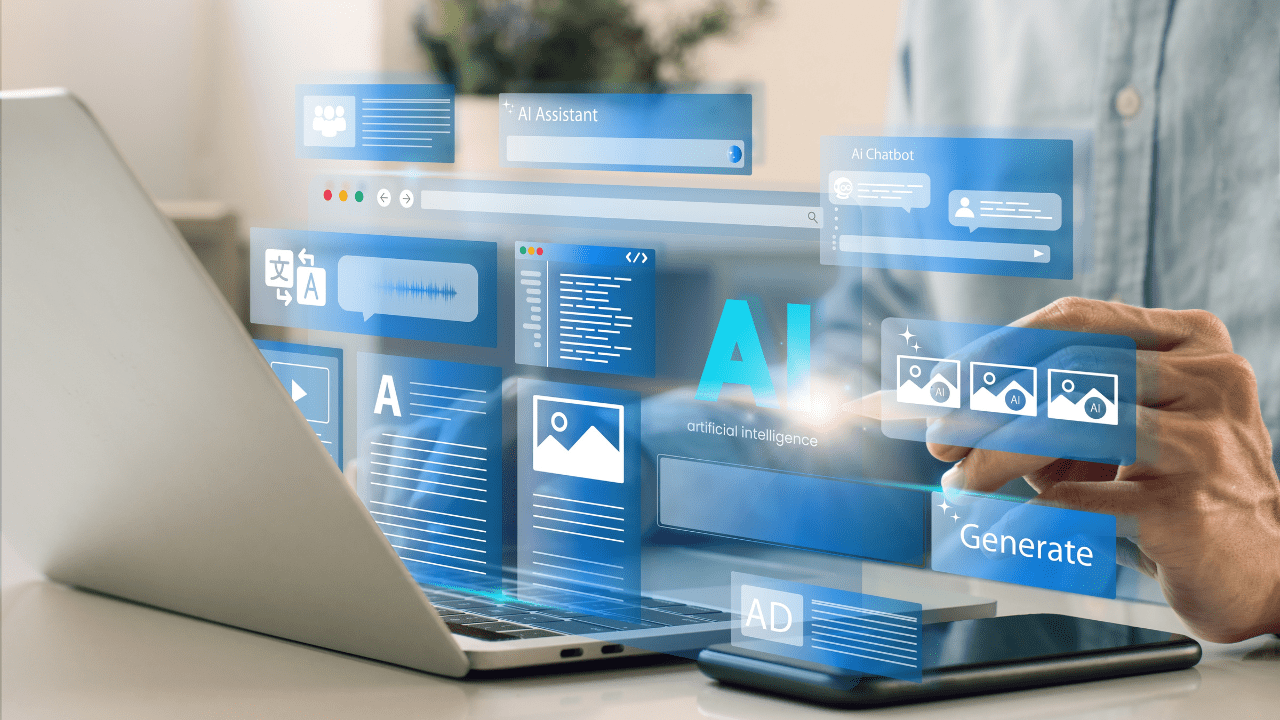3 AI Trends in B2B Marketing We’re Watching in 2025
If you thought AI advanced at breakneck speed in 2024, you’d better buckle up. All signs point to an accelerated pace of change in 2025, with some predictions nearly jaw-dropping. One area where it’s projected to have a major impact is marketing—specifically, how B2B companies connect with and engage prospects and customers.
Keeping Pace with AI’s Breakneck Advancement
Generative AI has moved rapidly from experimentation to real-world application in marketing. By mid-year 2024, more than 60% of marketers were prioritizing AI investments as their primary focus, evaluating many use cases where the technology can solve challenges and drive measurable business results.
Despite all the advances though, AI remains narrow in its capabilities: It’s great at some specific tasks, yet it can’t transfer knowledge across domains or perform general intellectual tasks the way humans can. Yet. With the AI development pace accelerating, that’s all poised to change.
But not to worry: You’re not on your own to keep pace with this rapid transformation, separate the real from the hype, and figure out how to adapt. As an AI-forward company, Marketri stays on the forefront of AI developments and how they’re redefining B2B marketing. From that perspective, we offer three trends we’re watching closely because we expect they’ll have a significant impact on the go-to-market strategies of leading B2B companies.
1. GPTs are revolutionizing the traditional search engine landscape.
While we’re still using “Google” as a verb, the fact is traditional search engines are on the wane. AI-powered tools like Perplexity and ChatGPT have evolved into the new search engines of choice for many, upending how B2B buyers access and interact with information online.
Gone are the days when a search engine served up a massive list of links, leaving you to do the heavy lifting. Now AI-powered tools summarize what they find across many sources, and that’s greatly streamlining your buyer’s research. If you’re not comfortable relying solely on an AI-generated summary, some tools include all the source links—so you can confirm they’re credible or read the original material yourself.
Perplexity even enables you to set it as your default search engine (and just launched online shopping capabilities!), which threatens to supplant Google as the leading search vehicle. But of course, Google isn’t standing still either. They’ve integrated AI into their platform to launch Search Generative Experience, a service that provides a curated summary response to your search request.
These new AI-powered search platforms are even testing the delivery of relevant ads alongside search results or within the curated response, creating a whole new marketing channel.
It’s a vastly different user search experience. And that means old tried-and-true marketing strategies and techniques will no longer suffice, especially when it comes to digital advertising, pay-per-click, and content marketing. If you’re not rethinking your marketing strategy in light of this major shift, you could end up absent from the AI-powered search engines your buyers are migrating to.
2. AI will start to give way to AGI
Today, AI is very good at handling specific tasks, like translating content into a different language or recognizing an image. Where AI is headed next is what many pundits are so excited about: the ability to perform any intellectual task a human can, which is known as Artificial General Intelligence (AGI).
While there doesn’t seem to be a single accepted definition of AGI, it’s anticipated that AGI will be able to understand, learn, and apply knowledge broadly, as well as or even better than a human. How long it will take until AGI becomes reality is still unclear, but that hasn’t stopped industry experts from making predictions. Perhaps the most ambitious forecast comes from OpenAI CEO Sam Altman, who believes AGI could arrive as early as 2025.
(Marketri has big, bold projections for 2025 too. Read our blog on what we believe marketing will look like in the coming year.)
Even if AGI isn’t ready for prime time that soon, in the coming year we’ll likely see major advancements in this direction thanks to billions of dollars in investment by tech titans like Google and Microsoft and global governments. As AI moves through progressively advanced levels, we can expect it to demonstrate better reasoning and problem-solving capabilities. That means AI could solve an entirely novel problem without specific training on the task—and explain its rationale and decision-making process.
Closer to our world, AGI has the potential to improve B2B marketing in several ways.
- It could enhance market analysis and strategy development. AGI will be able to analyze a much more massive set of data than any human could. That will aid B2B marketers in identifying trends and opportunities, developing more effective marketing strategies, and making data-driven decisions about how to optimize marketing.
- It could improve buyer behavior and market trend prediction. Consider the value of accurately predicting your customer churn rate based on a complex interplay of factors, or forecasting how your market will shift based on economic, social, and industry-specific trend data. While AI-powered tools like Optimove, Google Analytics 4, and Salesforce Einstein are already improving how we forecast sales and anticipate customer needs, AGI could take these capabilities to a whole new level.
- It will make personalized marketing more feasible at scale. AGI is likely to transform how B2B companies interact with buyers and customers, leveraging huge data stores to engage in highly personalized ways, with full context awareness. And that will help marketers optimize lead generation and drive more revenue.
3. AI tools will integrate with many more applications.
AI-powered tools are increasingly connected with each other and with entirely different applications, creating solutions that are more powerful and useful.
The integration of Zoom and Perplexity is a great example. We imagine our clients using this combined tool on a B2B sales call, with Perplexity assisting the rep by analyzing the conversation as it’s happening and pulling up relevant product information in response. At the end of the call, all the attendees can receive an AI-generated, concise summary and a list of action items.
AI-integrated tools like these will create a more comprehensive ecosystem, capable of handling more tasks and delivering more value than any single application alone. That will create tremendous opportunities to improve B2 marketing in many ways—from fueling better results to delivering better data-driven insights and improving efficiencies.
For instance:
- An AI tool integrated with a CRM solution can analyze customer data, yielding much more personalized email marketing campaigns.
- An integrated AI solution could monitor and automatically fine-tune the marketing campaign strategy based on how various channels and content are performing.
- An AI writing tool that’s integrated with a data analysis solution could empower marketers to generate data-driven reports more efficiently.
Staying Ahead in an AI Driven World
These are just a few of the nearly-endless ways AI will reshape and power-up marketing as it’s progressively integrated into other tools that marketers already rely on.
The pace of change isn’t going to slow down any time soon, on the AI front or otherwise. And these shifts will alter the B2B marketing landscape in ways we can’t even foresee yet. If you lead a middle market B2B company, it’s likely you don’t have the internal bandwidth to keep up with these developments and figure out how to adapt your marketing in response.
That’s just one reason growth-minded B2B companies partner with Marketri. Our fractional marketing agency stays current on AI developments and how they can improve our clients’ marketing results. And we bring the unique skills and expertise to leverage AI and other technologies to generate predictable revenue growth.
Schedule a call with our president Deb Andrews to learn how our fractional marketing agency can power-up your marketing and help you drive more growth in 2025.





